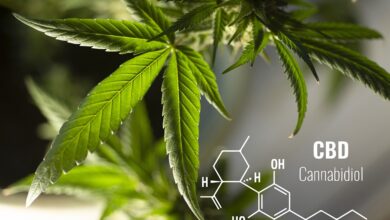The Science Behind Delta 9 THC and Its Effects on the Body

Introduction
Delta 9 THC, or tetrahydrocannabinol, is the primary psychoactive compound found in cannabis. It is responsible for the “high” that is often associated with marijuana use. As marijuana and cannabis products become more widely accepted and legalized, there is a growing interest in understanding the science behind delta 9 THC and its effects on the body.
Delta 9 THC acts on the endocannabinoid system, a complex network of receptors and neurotransmitters that plays a crucial role in regulating many physiological processes, including mood, appetite, pain, memory, and more. When delta 9 THC interacts with the endocannabinoid system, it can produce a wide range of effects, both positive and negative. In this article, we will explore the science behind delta 9 THC and its effects on the body.
The Endocannabinoid System
The endocannabinoid system (ECS) is a complex network of neurotransmitters, receptors, and enzymes that play a critical role in regulating various physiological processes in the body. The ECS is involved in the regulation of mood, appetite, pain, memory, and more. It consists of two primary types of receptors, known as CB1 and CB2 receptors, as well as two main endocannabinoids, anandamide, and 2-AG.
CB1 receptors are primarily found in the central nervous system, while CB2 receptors are predominantly found in the peripheral nervous system and immune cells. When delta 9 THC binds to CB1 and CB2 receptors, it can produce a wide range of effects on the body and mind.
The Effects of Delta 9 THC on the Body
The effects of delta 9 THC on the body are diverse and can vary depending on factors such as the dose, the method of consumption, and individual differences in metabolism and sensitivity to the compound.
One of the most well-known effects of delta 9 THC is its psychoactive properties. When delta 9 THC binds to CB1 receptors in the brain, it can alter the release of neurotransmitters and produce feelings of euphoria, relaxation, and altered perception of time and space. These effects are what make marijuana and cannabis products desirable for recreational use.
In addition to its psychoactive effects, delta 9 THC has the potential to produce a wide range of effects on the body, including:
1. Pain relief: Delta 9 THC has been shown to have analgesic properties and may be effective in reducing pain, especially chronic pain associated with conditions such as arthritis, neuropathy, and cancer.
2. Appetite stimulation: Delta 9 THC can increase appetite and may be beneficial for individuals experiencing loss of appetite due to medical conditions or treatments such as chemotherapy.
3. Anti-nausea and anti-emetic effects: Delta 9 THC has been shown to reduce nausea and vomiting, making it potentially beneficial for individuals undergoing chemotherapy or experiencing symptoms of conditions such as Crohn’s disease and HIV/AIDS.
4. Relaxation and stress relief: Delta 9 THC can produce a calming and relaxing effect, making it potentially useful for individuals struggling with anxiety, stress, and insomnia.
5. Cognitive effects: Delta 9 THC can impair short-term memory, attention, and decision-making, as well as affect coordination and motor skills. These effects are why driving under the influence of delta 9 THC is illegal in many jurisdictions.
The science behind delta 9 THC and its effects on the body is still being actively researched, and new discoveries are constantly being made. Research has also shown that delta 9 THC interacts with other systems in the body, such as the opioid system, to produce its effects.
Frequently Asked Questions
Q: Is delta 9 THC addictive?
A: Delta 9 THC has the potential to be addictive, especially for individuals who use it regularly and in high doses. However, not everyone who uses delta 9 THC will become addicted to it, and the risk of addiction varies depending on individual factors such as genetics and mental health.
Q: Can delta 9 THC cause negative side effects?
A: Yes, delta 9 THC can produce negative side effects, especially at high doses. Common side effects of delta 9 THC use include anxiety, paranoia, dry mouth, red eyes, increased heart rate, and impaired cognitive function. Long-term use of delta 9 THC may also be associated with memory and cognitive impairments.
Q: Is delta 9 THC safe for medical use?
A: Delta 9 THC has been approved for medical use in some jurisdictions for the treatment of conditions such as chronic pain, nausea, and cachexia. However, it is essential to use delta 9 THC under the guidance of a healthcare professional, as its safety and efficacy can vary depending on individual health conditions and medical history.
Q: What are the different methods of consuming delta 9 THC?
A: Delta 9 THC can be consumed in various ways, including smoking or vaporizing dried cannabis flowers, ingesting edibles, using tinctures or oils, and applying topicals such as creams and lotions. Each method of consumption has its own unique onset, duration, and intensity of effects.
In conclusion, delta 9 THC is a complex compound with diverse effects on the body and mind. While it has the potential to produce both positive and negative effects, more research is needed to fully understand its mechanisms of action and its potential for medical and recreational use. It is important for individuals to be aware of the risks and benefits of delta 9 THC and to use it responsibly and under the guidance of a healthcare professional.
[ad_2]




